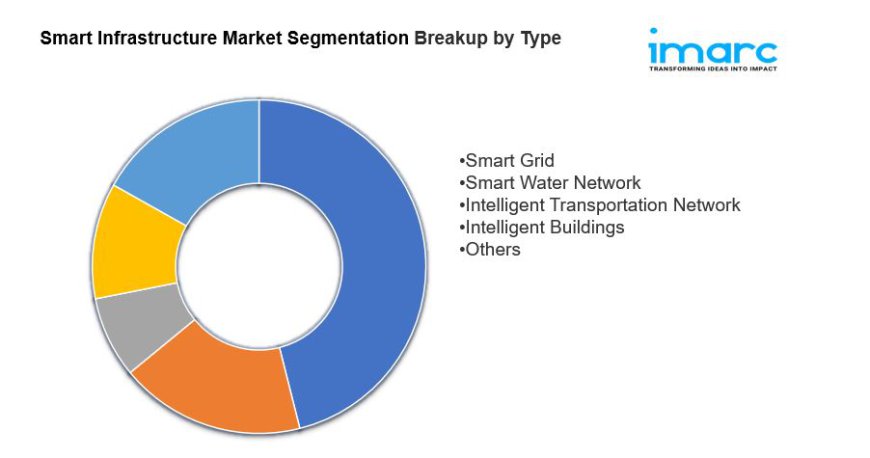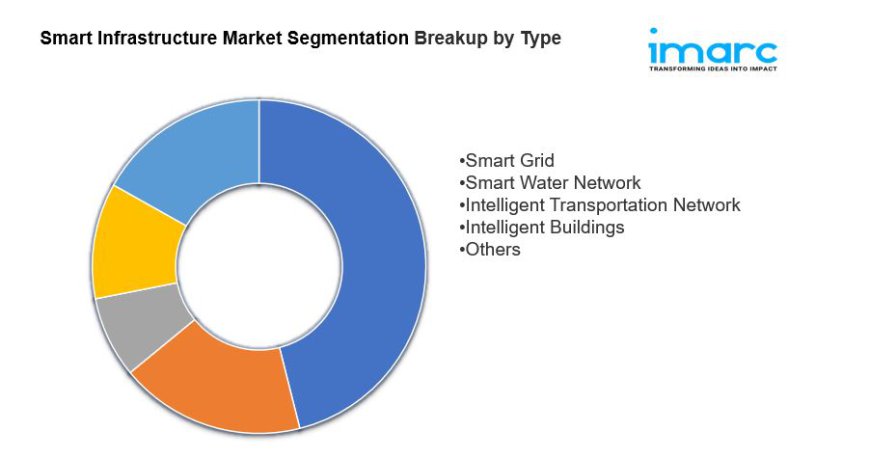Smart Infrastructure Market is Expected to Reach USD 874.1 Billion by 2033
The global smart infrastructure market size reached USD 179.1 Billion in 2024. Looking forward, IMARC Group expects the market to reach USD 874.1 Billion by 2033, exhibiting a growth rate (CAGR) of 19.26% during 2025-2033.

Smart Infrastructure Market Size 2025-2033:
- The global smart infrastructure market size reached USD 179.1 Billion in 2024.
- The market is expected to reach USD 874.1 Billion by 2033, exhibiting a growth rate (CAGR) of 19.26% during 2025-2033.
- North America leads the market, accounting for the largest smart infrastructure market share.
- Smart grid accounts for the majority of the market share in the product type segment because they facilitate the integration of renewable energy sources into the electrical supply and increase energy efficiency and reliability.
- The built environment holds the largest share in the smart infrastructure industry.
- The increasing focus on public safety and security as cities and organizations invest in smart surveillance, emergency response systems, and integrated security solutions to enhance the safety of residents and assets is impelling the market growth.
- The rising importance of data-driven decision-making is also influencing the smart infrastructure market, as organizations leverage advanced analytics and real-time data to optimize operations, improve service delivery, and enhance overall infrastructure performance.

Industry Trends and Drivers:
- The increasing need for urbanization and smart city development:
One of the primary drivers of the smart infrastructure market is the increasing need for urbanization and smart city development. As the global population continues to rise and urban areas expand, cities face significant challenges related to transportation, waste management, water supply, and public safety. Smart infrastructure solutions, such as intelligent transportation systems, smart grids, and automated waste management systems, are being developed to address these challenges effectively. By leveraging technology and data analytics, cities can optimize resource allocation, improve public services, and enhance the overall quality of life for residents. The growing emphasis on creating sustainable and efficient urban environments has led governments and municipalities to invest in smart infrastructure initiatives, thereby aiding the market growth.
The demand for sustainability and energy efficiency:
As climate change and environmental concerns become increasingly prominent, organizations and governments are prioritizing the adoption of sustainable practices to reduce their carbon footprints. Smart infrastructure technologies, such as energy-efficient building systems, smart grids, and renewable energy integration, enable better energy management and consumption monitoring. By implementing these solutions, organizations can significantly reduce energy waste, lower operational costs, and comply with regulatory standards aimed at promoting sustainability. Additionally, the transition to renewable energy sources, such as solar and wind, is driving the adoption of smart infrastructure solutions that facilitate efficient energy distribution and consumption, further contributing to the growth of the market.
- Advancements in Internet of Things (IoT) technologies:
The advancements in IoT technologies play a crucial role in driving the smart infrastructure market. The proliferation of IoT devices and sensors allows for real-time data collection, analysis, and communication, enabling smarter decision-making and enhanced operational efficiency. IoT technologies facilitate the development of interconnected systems that can monitor and manage various infrastructure components, such as traffic signals, lighting systems, and utility services. This connectivity enhances the responsiveness of infrastructure to changing conditions, thereby improving service delivery and resource management. Furthermore, advancements in data analytics and artificial intelligence enable organizations to derive actionable insights from the vast amounts of data generated by IoT devices, leading to more informed planning and operational strategies is supporting the market expansion.
Request for a sample copy of this report: https://www.imarcgroup.com/smart-infrastructure-market/requestsample
Smart Infrastructure Market Report Segmentation:
Breakup By Type:
- Smart Grid
- Smart Water Network
- Intelligent Transportation Network
- Intelligent Buildings
- Others
Smart grids account for the majority of shares due to their ability to enhance energy efficiency, improve reliability, and enable the integration of renewable energy sources into the electricity supply.

Breakup By End User:
- Utility
- Transport
- Communications
- Built Environment
The built environment dominates the market by end-user because it encompasses a wide range of applications, including commercial, residential, and industrial buildings that increasingly adopt smart technologies for energy management and operational efficiency.
Breakup By Region:
- North America (United States, Canada)
- Asia Pacific (China, Japan, India, South Korea, Australia, Indonesia, Others)
- Europe (Germany, France, United Kingdom, Italy, Spain, Russia, Others)
- Latin America (Brazil, Mexico, Others)
- Middle East and Africa
North America holds the leading position in the smart infrastructure market due to its advanced technological landscape, significant investments in smart city initiatives, and supportive government policies promoting infrastructure modernization and sustainability.
Top Smart Infrastructure Market Leaders:
The smart infrastructure market research report outlines a detailed analysis of the competitive landscape, offering in-depth profiles of major companies.
Some of the key players in the market are:
- Aclara Technologies LLC (Hubbell Incorporated)
- ABB Limited
- AVEVA Group Limited
- Black & Veatch Holding Company
- Cisco Systems Inc.
- Schneider Electric SE
- Sensus USA Inc. (Xylem Inc.)
- Siemens AG
- Verizon Communications Inc

Ask An Analyst: https://www.imarcgroup.com/request?type=report&id=8788&flag=C
If you require any specific information that is not covered currently within the scope of the report, we will provide the same as a part of the customization.
About Us:
IMARC Group is a global management consulting firm that helps the world’s most ambitious changemakers to create a lasting impact. The company provide a comprehensive suite of market entry and expansion services. IMARC offerings include thorough market assessment, feasibility studies, company incorporation assistance, factory setup support, regulatory approvals and licensing navigation, branding, marketing and sales strategies, competitive landscape and benchmarking analyses, pricing and cost research, and procurement research.
Contact us:
IMARC Group
134 N 4th St. Brooklyn, NY 11249, USA
Email: sales@imarcgroup.com
Tel No:(D) +91 120 433 0800
United States: +1-631-791-1145

 jamessmithjimmy12
jamessmithjimmy12